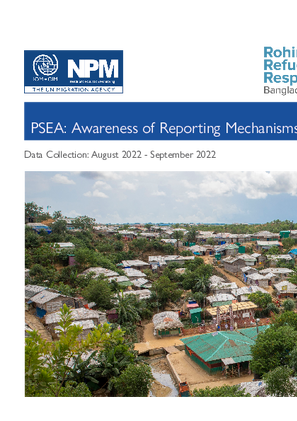-
Countries
-
Data and Analysis
-
Special Focus
-
Crisis Responses
Bangladesh — PSEA: Awareness of Reporting Mechanisms for Sensitive Issues in the Rohingya Camps (August-September 2022)

Contact
NPM Bangladesh, npmbangladesh@iom.int
Language
English
Location
Bangladesh
Period Covered
Aug 01 2021
May 30 2022
Activity
- Survey
- Community Perception
In the displacement contexts, it is likely that the psychosocial implications of displacement and the breakdown of the usual protective institutions such as the family, community, government, law enforcement structures, etc. increases the intensity of different protection issues. Since affected populations might have limited awareness of their rights and entitlements in an unfamiliar environment also instigates risks of exploitation and abuse. Although Sexual Exploitation and Abuse (SEA) by humanitarian workers can occur in any humanitarian or development context, in the emergency context there is a higher risk of all forms of misconduct, including SEA 1 as the emergency leads to a rapid increase in the number of partners operating in the humanitarian response, rapid recruitments and staff turnover, high work pressures, and challenges to ensuring effective coordination and oversight. A PSEA network was enacted in 2017 for the prevention of and response to sexual exploitation and abuse. Currently, IOM-NPM in coordination with the PSEA network conducted an assessment to investigate the perception of Rohingya refugees on existing complaints and feedback mechanisms (CFMs) in the camps especially focusing on reporting sensitive issues including Sexual Exploitation and Abuse (SEA). The same assessment was conducted between December 2021 and January 2022 in four different camps (Camps 4 Ext, 13, 15, and 16). In this round, 6 new camps were assessed that employ 90 surveys in each camp.